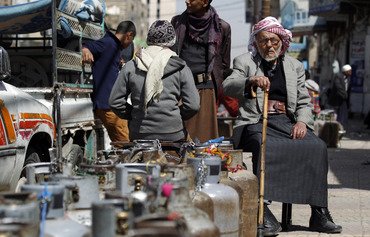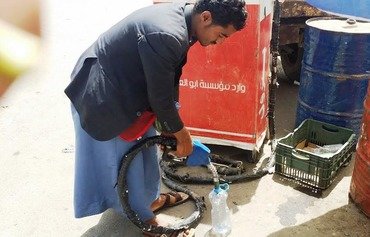The Houthis (Ansarallah) have doubled the price of oil derivatives in Sanaa and other provinces under the group's control, aggravating the humanitarian situation in Yemen due to the ensuing increase in food prices.
Under the new official price for oil derivatives, the cost of 20 litres of petrol increased from 4,300 riyals ($17) to 8,500 riyals ($34).
Most stations in Sanaa that sell oil derivatives appear to be either closed or selling petrol at the new prices.
The hike in prices came after Houthi leader Saleh al-Sammad, head of the so-called Supreme Political Council, announced on November 15th his decision to freeze the work of the Yemen Petroleum Company.
Yemen Petroleum Company (YPC) spokesman Anwar al-Ameri said the imposition of the new oil derivatives prices is a painful blow to the poor Yemeni citizen.
"Saleh al-Sammad's decision, which froze the work of the Yemen Petroleum Company and made it nothing more than warehouses for oil derivatives traders, is the key factor behind the oil prices hikes and the imposition of new prices," he said in a statement aired by local media on November 24th.
Hike affects price of food
Economists have warned of negative consequences from oil derivatives price hikes on the price of food and other commodities.
"The increase in prices of oil derivatives, including petrol, domestic gas and diesel, will have negative consequences and will further aggravate the humanitarian sufferings of Yemenis and lead to greater famine," Mustafa Nasr, chairman of the Studies and Economic Media Centre, told Al-Mashareq.
"The increase in oil prices will be negatively reflected on the prices of services and commodities," he said.
"Poor citizens will bear the brunt of the new prices which will benefit a network of oil derivatives traders and some influential people close to the Houthis," he said.
The new prices have sparked large-scale resentment in Sanaa, prompting a number of social media activists to launch a campaign to "boycott" fuel oil.
"The goal of this campaign is to force oil derivatives traders to return to previous prices or cut their prices," Mohammed al-Mawri, a Facebook activist, told Al-Mashareq.
"The boycott campaign includes calling on car owners to park their cars on public streets to stop traffic," he said.

![Yemenis wait in line to receive cooking gas cylinders in Sanaa in early November, 2017. [Abu Bakr al-Yamani/Al-Mashareq]](/cnmi_am/images/2017/11/28/10497-yemen-fuel-crisis-600_384.jpg)






